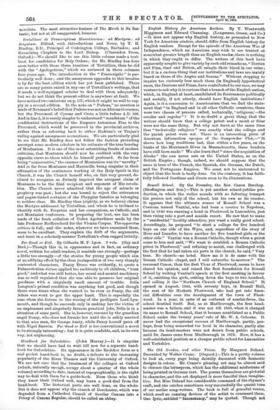Tertulliani de Praescriptione Haereticorum : ad Martyras : ad 8capulam.
Edited, with Introductions and Notes, by T. H. Bindley, B.D., Principal of Codrington College, Barbados; and Examining Chaplain to the Lord Bishop. (Clarendon Press, Oxford.)—We should like to see this little volume made a text- book for candidates for Holy Orders ; for Mr. Bindley has done even better with these three treatises of Tertullian, than he did with the " Apologeticus," which we reviewed in these columns four years ago. The introduction to the " Praescriptio " is par- ticularly well done; and the anonymous appendix to this treatise is by far the best edition which has yet been published. There are so many points raised in any one of Tertullian's writings, that it needs a well-equipped scholar to deal with them adequately; but we do not think the present editor is anywhere at fault. We have noticed two omissions on p. 137, which it might be well to sup- ply in a second edition. In the note on " Pudens," no mention is made of Neumann's belief that Pudensnot an African Governor, but the Proconsul of Cyrene and Crete a little before A.D. 166. And in line 5, it is surely simpler to understand " mandatum " of the confidential instructions of the Emperor Antoninus Pius to the Proconsul, which would be preserved in the provincial archives, rather than as referring back to either Hadrian's or Trajan's ruling against anonymous accusations. We are particularly glad to see that Mr. Bindley does not follow the fashion prevailing amongst some modern scholars in his estimate of the true bearing of Montanism. It is one of the most astonishing freaks of modern criticism, that Montanus should now be credited with the very opposite views to those which he himself professed. So far from being "conservative," the essence of Montanism was its " novelty." And so far from Montanus and Maximilla being singular in their affirmation of the continuous working of the Holy Spirit in the Church, it was the Church herself who, on this very ground, de- clined to recognise as divinely inspired the arrogant claim of Montanus to be the final recipient and exponent of His revela- tion. The Church never admitted that the age of miracle or prophecy was past ; but she was bound to reject the utterances and pagan-tinted ecstasies of the Phrygian fanatics as belonging to neither class. Mr. Bindley thus (rightly, as we believe) claims the Martyrs addressed by Tertullian, and whom he is inclined to identify with St. Perpetua and her companions, as Catholic, and not Montanist confessors. In preparing the text, use has been made of the fresh collation of Codex Agobardinus made by the late Professor Reifferscheid for the Vienna Corpus. The apparatus criticus is full ; and the notes, wherever we have examined them, seem to be excellent. They explain the drift of the arguments, and treat in a scholarly manner Tertullian's often rugged latinity.


















































 Previous page
Previous page